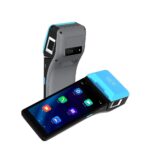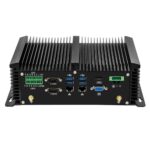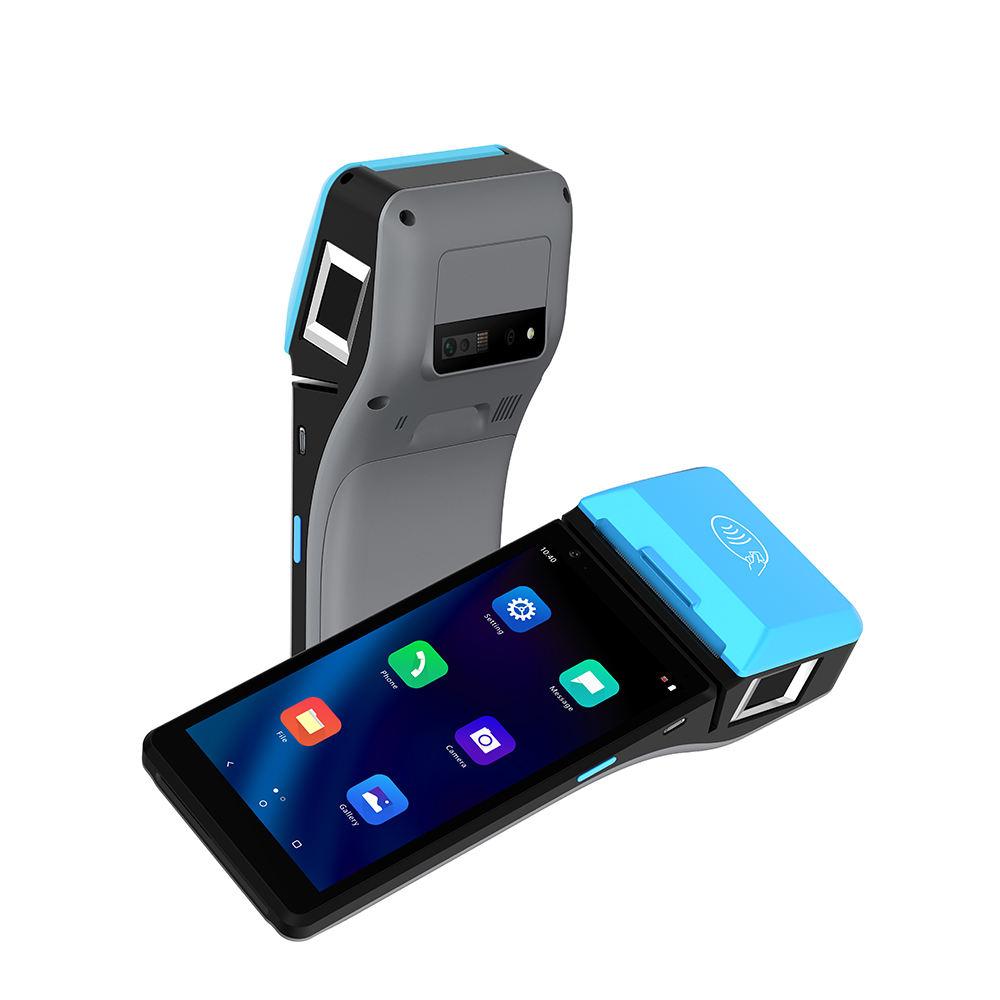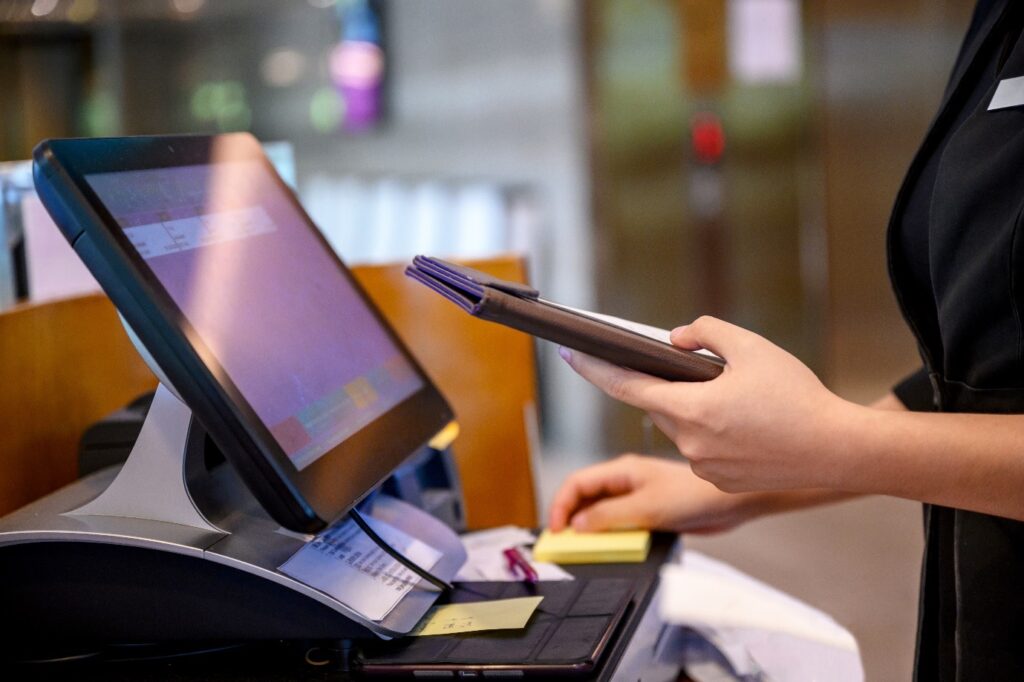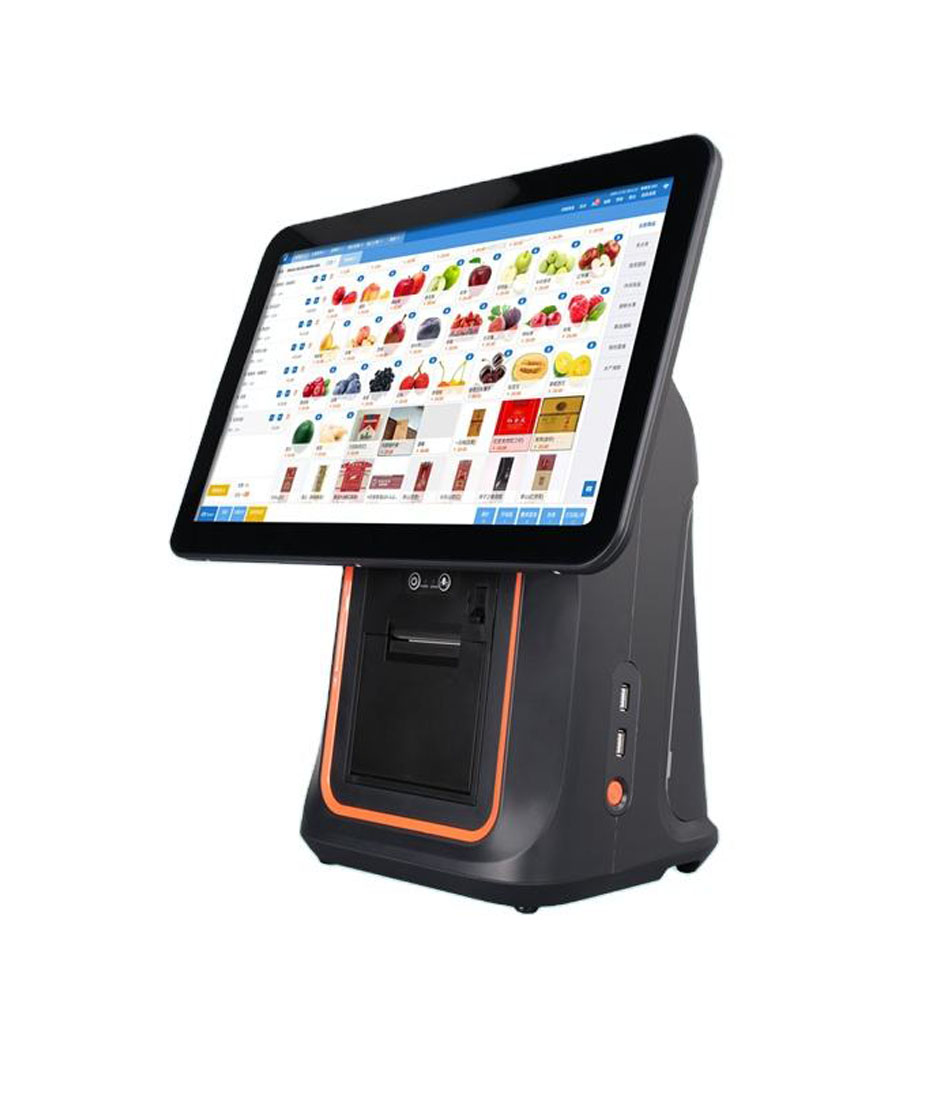
If you want the best pos system for your small business, Square stands out for good reason. You can start with no monthly fee, which helps when every dollar counts. In fact, nearly 29% of small businesses in the U.S. use Square as their main POS system. It’s simple to set up, flexible, and works for many types of shops. Other great choices include Shopify POS, Helcim, Clover, and DcaPOS, which lets you customize hardware for your exact needs.
Key Takeaways
- Square is a great pick for small businesses. It is simple to use and does not cost much. It works well for many kinds of stores.
- Pick a POS system that matches your budget and needs. Compare prices, features, and hardware before you choose.
- Find a POS system that is easy to learn. Make sure it has good support to help you and your team. This can help you avoid problems.
- Choose a POS system that works with other tools you use. It should connect with things like accounting or online sales. This will help you save time and stay organized.
- Get a POS system that can grow with your business. You should be able to add more locations, devices, and features when you need them.
Comparison Table
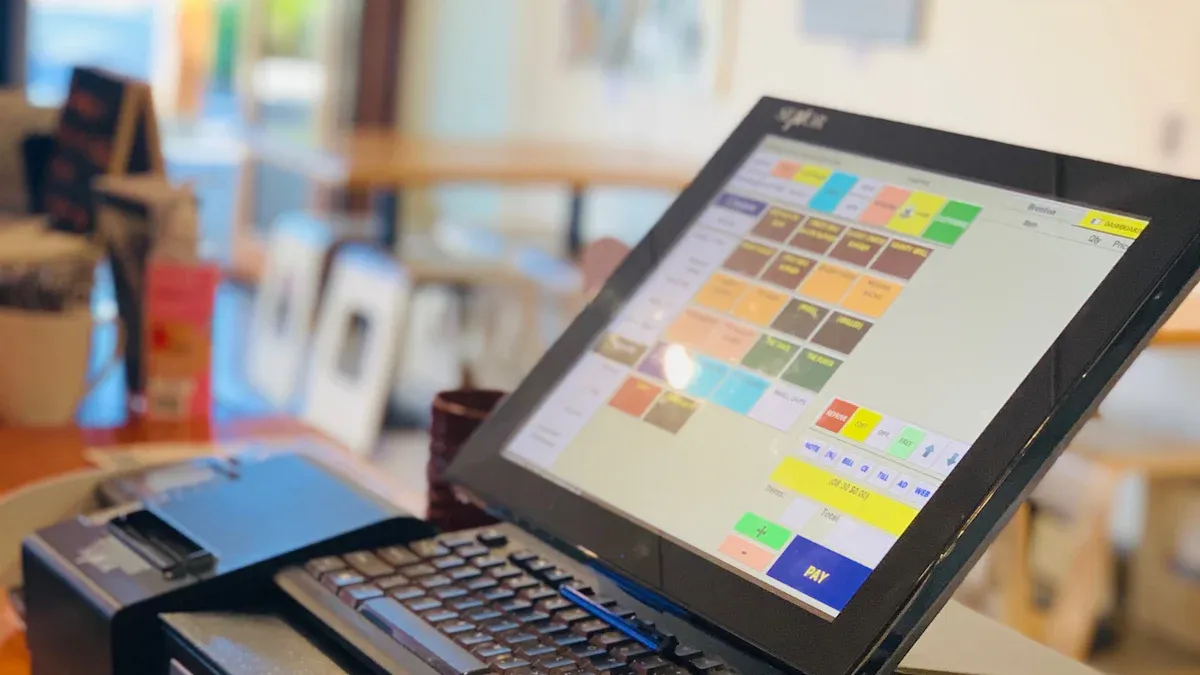
Best POS System Features
When you want the best pos system, you need one that helps your business. It should make things simple for you. Here is a table to compare the top choices side by side:
| POS System | Key Features | Hardware Options | Best Use Cases |
|---|---|---|---|
| Square | Easy setup, free plan, basic inventory, mobile payments, app integrations | Mobile readers, registers, terminals | Retail, food trucks, pop-ups |
| Shopify POS | Advanced inventory, eCommerce integration, customer profiles, analytics | Shopify readers, iPads, POS kits | Online + in-store retail, boutiques |
| Helcim | Transparent pricing, advanced reporting, CRM, multi-location support | Card readers, terminals | Service businesses, retail |
| Clover | Employee management, loyalty, table management, robust reporting | Clover Station, Mini, Flex, Go | Restaurants, retail, healthcare |
| DcaPOS | Custom hardware, Android/Windows options, self-service kiosks, displays | All-in-one POS, kiosks, printers, more | Retail, hospitality, education, more |
Tip: Pick the features that matter most to you. Some people want inventory tracking. Others care about customer management or easy payments. Choose the best pos system for your needs.
Pricing and Use Cases
You need a system that fits your money plan and business type. Here is what you can expect:
- Square: The basic plan is free. Transaction fees start at 2.6% plus 10¢. Hardware starts at $0 for a reader.
- Shopify POS: Monthly plans cost from $39 to $399. Transaction fees are 2.4% to 2.6% plus 30¢. Hardware includes mobile readers and full kits.
- Helcim: No monthly fee. Payment processing rates are low and clear. Hardware costs extra.
- Clover: Monthly fees start at $14.95. Hardware starts at $599. This is best for businesses that need more features.
- DcaPOS: Hardware prices are custom. You get solutions made for retail, hospitality, healthcare, and more.
If you have a pop-up shop or food truck, Square could be the best pos system for you. Shopify POS is great for stores that sell online and in person. Helcim is good for service businesses that want simple pricing. Clover is a good fit for restaurants and big stores. DcaPOS is best if you need special hardware or want to grow your business.
What Makes the Best POS System
Affordability
You want a POS system that fits your budget. Most small business owners look at upfront costs, monthly fees, and how flexible the contracts are. Many entry-level POS systems cost between $40 and $100 per month, but some, like Square, even offer a free plan. Here’s a quick look at what you might pay:
| POS System | Monthly Cost | Hardware Cost |
|---|---|---|
| Square | Free–$165 | Free reader included |
| Clover | $14.95+ | From $49 |
| Shopify POS | $1–$29+ | Varies |
You should also check transaction fees. For example, Square charges 2.6% plus 10¢ per in-person sale, while Helcim starts at 1.83% plus 8¢. Picking the best pos system means finding one that keeps costs low and fits your sales style.
Ease of Use
You need a POS system that is easy for you and your team to learn. Square gets high marks for its simple design and quick setup. Most staff can learn the basics in just a few hours. A user-friendly system helps you avoid mistakes and saves time on training. If you want to spend less time teaching and more time selling, choose a system with an intuitive interface.
Support and Training
Great support matters. Look for POS providers that offer 24/7 help, including phone and email support. Many top systems include onboarding help, training tools, and fast response times—often under an hour. Good support means you can solve problems quickly and keep your business running smoothly.
Tip: Pick a POS system that includes training and troubleshooting tools. This helps new staff get up to speed fast.
Integrations
Your POS should work well with other tools you use. Popular integrations include accounting software like QuickBooks, eCommerce platforms, payroll, and delivery services. These connections help you manage sales, inventory, and customers all in one place. Square and Shopify POS both offer many third-party integrations, making them strong choices if you want to streamline your business.
Scalability
As your business grows, your POS system should grow with you. The best pos system lets you add new locations, registers, and features without starting over. Cloud-based systems make it easy to expand and update. You can manage inventory, sales, and staff across all your stores from one dashboard. This flexibility helps you stay focused on your customers, not your technology.
Top POS System Reviews
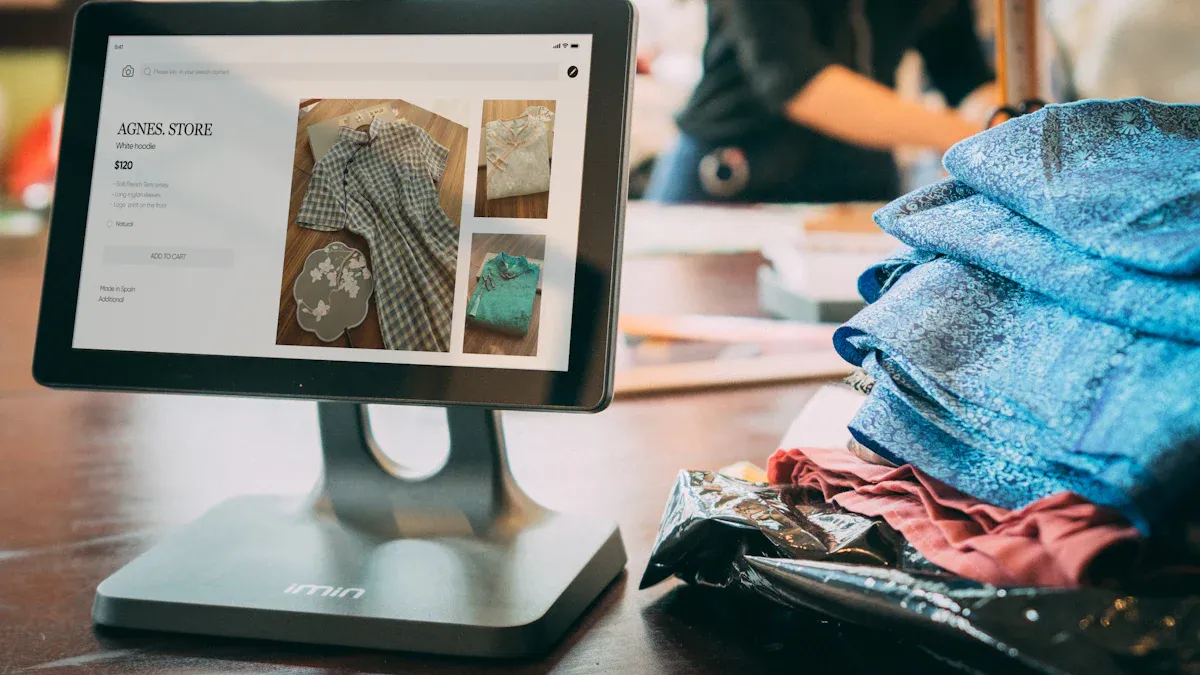
Square
Square is liked by many small business owners. You can set it up fast and start selling right away. The system works on your phone, tablet, or with Square’s hardware. There is a free plan, so you only pay when you make a sale. Square is good for retail shops, food trucks, and service businesses.
| Pros | Description |
|---|---|
| User-friendly interface | You and your team can learn it quickly. |
| Affordable and transparent pricing | There are no hidden fees or contracts. |
| Mobile compatibility | You can take payments anywhere, even at pop-up events. |
| Comprehensive reporting and analytics | You can track sales and see trends easily. |
| Basic inventory management | You get alerts when stock is low. |
| Integrated ecosystem | It connects with tools like accounting and payroll. |
| Cons | Description |
|---|---|
| Fund withholding issues | Sometimes Square holds your money to review it. |
| Higher transaction fees | Costs can go up as your business grows. |
| Limited customer support | There is no 24/7 phone help. |
| Basic inventory features | It is not great for big or complex stores. |
| Limited customization | It may not fit every business need. |
Pricing and Plans
| Business Type | Subscription Plans (Monthly) | Transaction Fees (In-Person) | Key Features and Benefits |
|---|---|---|---|
| Retail | Free ($0), Plus ($89+), Premium (Custom) | 2.6% + $0.10 to 2.9% + $0.30 | Advanced inventory, loyalty, staff management, cost tracking |
| Restaurants | Free ($0), Plus ($69+), Premium ($165) | 2.6% + $0.10 to 2.9% + $0.30 | Menu tools, auto-gratuity, seat tracking |
| Appointment-based | Free (Individual), Plus ($29), Premium ($69) | 2.6% + $0.10 to 2.9% + $0.30 | Reminders, no-show protection, multi-staff booking |
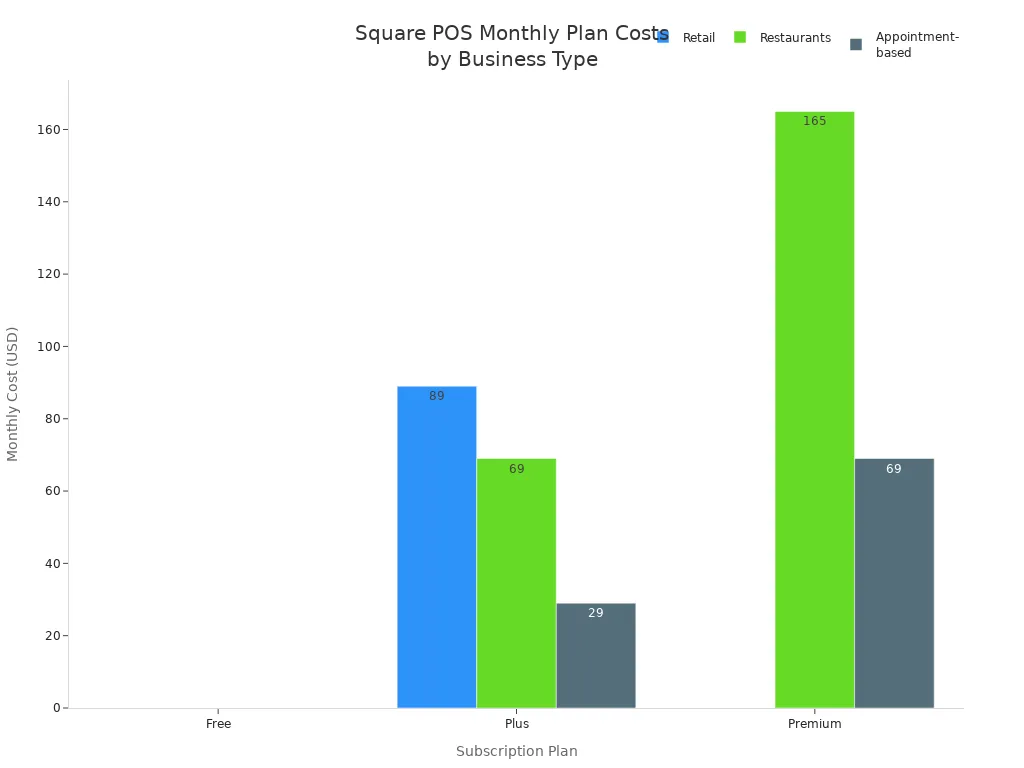
Square is a smart choice if you want the best pos system for simple, low-cost, and mobile sales. It works well for retail, food trucks, and service businesses.
Shopify POS
Shopify POS is a good pick if you sell online and in a store. You can manage your inventory, customers, and sales in one place. The system keeps your online and store sales in sync, so you do not oversell. Shopify POS is easy to use and has strong reporting tools.
Advantages:
- The interface is easy, so training is simple.
- It keeps online and in-person sales and inventory synced.
- You can sell on many channels from one dashboard.
- There are hardware options you can change.
- You get detailed sales reports.
Drawbacks:
- There are not many offline payment options.
- It works best for businesses with an online store.
- Store-wide discounts can take extra steps.
- Some features cost more each month.
- Basic analytics may not be enough for big stores.
| Unique Features | Drawbacks |
|---|---|
| Real-time inventory sync across online and in-store sales | Advanced plans can be costly |
| Omnichannel selling (buy online, pick up in-store) | Extra transaction fees with third-party processors |
| Easy-to-use interface | Not many offline payment options |
| Custom hardware options | Less flexible than open-source POS |
| Scalable for single or multi-location stores | Hardware is not included in the subscription |
Pricing
- Shopify POS Lite comes with Shopify plans starting at $39/month.
- Shopify POS Pro is $89/month per location for more features.
- Transaction fees are 2.4% to 2.9% per sale.
Shopify POS is best if you have a retail store with an online shop and want everything together.
Helcim
Helcim is a good choice if you want clear pricing and no monthly fees. You only pay for what you use. The system works on phones, tablets, and computers. Helcim gives you free POS software with sales, inventory, and customer tools. You can take payments in-person, online, or on the go.
Advantages:
- There are no monthly fees or long contracts.
- Pricing is clear and easy to understand.
- The POS app is free for phones, tablets, and computers.
- You get real-time inventory tracking and alerts.
- There are sales reports and analytics.
- It supports many payment types, including mobile and online.
- Software updates are free in the cloud.
Disadvantages:
- Hardware costs extra, especially for the Smart Terminal.
- It is not for high-risk or very low-volume businesses.
- You need a steady internet connection.
Helcim works well for:
- Mobile businesses like food trucks and pop-up shops.
- Small retailers such as boutiques and coffee shops.
- Service providers who need to manage appointments and payments.
Helcim is a strong choice if you want a flexible, low-cost POS with no monthly fees and easy payment options.
Clover
Clover gives you many hardware choices, from handheld devices to full POS stations. You can pick what fits your business best. The system is easy to set up and use. Clover has a big app market, so you can add features as you grow. It works well for restaurants, retail, and service businesses.
Strengths:
- The interface is easy to use.
- It works offline if your internet goes down.
- There are many hardware options (Station, Mini, Flex, Go).
- It has strong POS features: inventory, employee management, CRM, reporting.
- There is a large app market for extra tools.
- It is cloud-based with remote access.
- You get 24/7 phone support.
Weaknesses:
- Hardware and software can be expensive.
- App costs can add up over time.
- You must use Clover hardware.
- Some plans need contracts.
- It is not great for very small startups or high-risk businesses.
Pricing
- Software starts at $14.95/month.
- Hardware starts at about $599.
- Plans and prices depend on your business type and needs.
Clover is a good pick if you want lots of hardware choices and strong features, especially for restaurants and growing retail stores.
DcaPOS
DcaPOS is different if you need custom POS hardware for your business. You can get devices made just for you, from the inside parts to the outside look. DcaPOS offers Android, Windows, or Linux systems, so you can use the software you like best. The hardware is tough and works well in busy places like kitchens or stores.
What makes DcaPOS unique:
- You can customize hardware, including branding and design.
- There are flexible operating systems and processors (Android, Windows, Linux).
- Devices are strong and built for tough places.
- You can order a few or many devices as you grow.
- The in-house team helps you make the right solution.
- OEM/ODM services give you branded, reliable, and affordable hardware.
- There are many mounting and display options, including touch and non-touch screens.
- Strong connections (Ethernet, Wi-Fi, POE) are available.
- Devices are certified for quality and safety (CE, RoHS, FCC, CCC).
- You get full support and advice after buying.
DcaPOS is a smart pick if you want the best pos system hardware for retail, hospitality, healthcare, education, or any business that needs something special. You can get more devices as you grow and trust that your hardware will last.
If you need a POS system that matches your brand and business needs, DcaPOS gives you the flexibility and support to make it happen.
Choosing the Best POS System
Step-by-Step Guide
Picking the best pos system for your business can feel like a big job, but you can break it down into simple steps:
- List Your Needs
Write down what you want your POS system to do. Think about payment types, inventory tracking, and customer management. - Check Payment Methods
Make sure your POS can handle cash, credit, debit, digital wallets, and contactless payments. This keeps your customers happy. - Look at Hardware
Decide if you need mobile readers, full registers, or custom devices. Some businesses need special hardware for busy kitchens or outdoor sales. - Compare Features
Review features like inventory management, employee tracking, and reporting. Pick what matches your business model. - Test the System
Try demos or free trials. See if the system is easy for you and your team to use. - Think About Growth
Choose a system that can grow with you. If you open more locations, you want your POS to keep up.
Key Questions to Ask
Before you decide, ask yourself these questions:
| Question | Why It Matters |
|---|---|
| Does it support all payment types? | You want to accept every way your customers pay. |
| Is it easy for staff to learn? | Training should be quick and simple. |
| Can it track inventory the way I need? | Retail and restaurants need different inventory tools. |
| Does it work with my other software? | Integrations save you time and reduce mistakes. |
| Is it secure and PCI compliant? | Protect your business and customer data. |
| What are the real costs? | Watch for monthly fees, transaction fees, and hardware costs. |
| Will it fit my business as I grow? | Scalability is key for future success. |
Mistakes to Avoid
You want to avoid common mistakes when choosing your POS:
- Don’t pick a system just because it’s popular. Make sure it fits your business.
- Don’t ignore hidden fees. Always check for extra charges.
- Don’t skip the demo. If you don’t test it, you might get stuck with a system that’s hard to use.
- Don’t forget about security. Only choose systems that meet PCI standards.
- Don’t overlook support. You need help when things go wrong.
Tip: Take your time and ask lots of questions. The right POS system can make your business run smoother and help you grow.
Square works best for most small businesses because it is easy, flexible, and affordable. You might find Shopify POS, Helcim, Clover, or DcaPOS fit your needs better if you want special features or custom hardware. Try a free trial or demo before you decide. Make sure your POS matches your business goals and daily tasks.
Ready to boost your business? Pick a POS system and see how much smoother your day can be!
FAQ
What is a POS system?
A POS system lets you take payments from customers. You can track sales, manage inventory, and print receipts. It helps you run your business faster and easier.
Do I need special hardware for a POS system?
You do not always need special hardware. Some POS systems work on your phone or tablet. If you want more features, you can add cash drawers, barcode scanners, or receipt printers.
Can I use my POS system for online and in-store sales?
Yes! Many POS systems, like Shopify POS and Square, let you sell online and in your store. You can keep your sales and inventory in sync.
How safe are POS systems for my business?
POS systems use strong security to protect your data. Look for PCI-compliant systems. Always update your software and use strong passwords.
Tip: Ask your POS provider about their security features before you buy.

